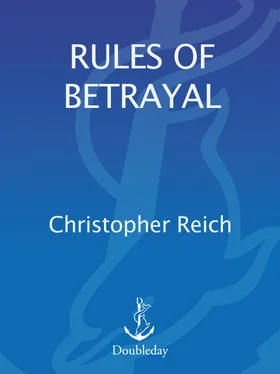Christopher Reich - Rules of Betrayal
Здесь есть возможность читать онлайн «Christopher Reich - Rules of Betrayal» весь текст электронной книги совершенно бесплатно (целиком полную версию без сокращений). В некоторых случаях можно слушать аудио, скачать через торрент в формате fb2 и присутствует краткое содержание. Жанр: Триллер, на английском языке. Описание произведения, (предисловие) а так же отзывы посетителей доступны на портале библиотеки ЛибКат.
- Название:Rules of Betrayal
- Автор:
- Жанр:
- Год:неизвестен
- ISBN:нет данных
- Рейтинг книги:4 / 5. Голосов: 1
-
Избранное:Добавить в избранное
- Отзывы:
-
Ваша оценка:
- 80
- 1
- 2
- 3
- 4
- 5
Rules of Betrayal: краткое содержание, описание и аннотация
Предлагаем к чтению аннотацию, описание, краткое содержание или предисловие (зависит от того, что написал сам автор книги «Rules of Betrayal»). Если вы не нашли необходимую информацию о книге — напишите в комментариях, мы постараемся отыскать её.
Rules of Betrayal — читать онлайн бесплатно полную книгу (весь текст) целиком
Ниже представлен текст книги, разбитый по страницам. Система сохранения места последней прочитанной страницы, позволяет с удобством читать онлайн бесплатно книгу «Rules of Betrayal», без необходимости каждый раз заново искать на чём Вы остановились. Поставьте закладку, и сможете в любой момент перейти на страницу, на которой закончили чтение.
Интервал:
Закладка:
“What happened to the lei and a welcome cocktail?” he asked.
“This isn’t a holiday, Dr. Ransom. School is now in session. We don’t have much time, and from what I just saw, we have far too much work to do. Now get some rest. I’ll be by at six to take you to dinner. Your clothes will be here by then.”
“Do you have a message for me from Frank Connor? He told me I’d hear from him.”
“Who?” The blue eyes bore down on him. It was not a name to be said aloud.
“No one,” said Jonathan, backpedaling. “I was mistaken.”
“I thought so.” The woman came closer and extended her hand. “I’m Danni. I’ll be your trainer.”
18
It was called “the Bubble,” but the official name for the soundproof chamber on the third floor of the Rayburn Office Building, one block from the Capitol, where testimony graded classified or higher was given to the House Subcommittee on Intelligence, was a SCIF, or Sensitive Compartmented Information Facility. The Bubble looked no different from a large, windowless office. It had four walls, a ceiling, and the usual painful fluorescent lighting. But the differences were there. The floor, walls, and ceiling were constructed of three-inch-thick cement and lined with soundproof acoustic tiles. To enter, one passed through a double set of alarmed doors and stepped up a half foot, the distance necessary to separate the Bubble from the original floor. A low level of white noise played constantly to frustrate any eavesdropping device. Finally, the Bubble benefited from its own power supply, connected to an independent generator in the building’s basement. Once the Bubble’s door closed, no sound could get in and no sound could get out.
“Hello, Joe,” said Connor, ducking his head inside the door of the SCIF. “Got a minute?”
The Honorable Joseph Tecumseh Grant, representative of the eleventh district of Nebraska and chairman of the House Subcommittee on Intelligence, stopped putting the day’s testimony into his satchel. “Frank? That you? What are you doing out of your coffin? I thought you spooks only came out at night.”
“Must have me confused with someone else.” Connor stood by the door as the last few stragglers left the chamber. “I’m a mortal like anyone else. Haven’t you heard? We do things aboveboard now. In daylight.”
Joe Grant crossed the room with alacrity, one hand extended for the shake. His birth certificate stated that he was sixty-five years old, but the combination of his lopsided grin and the thatch of shoe-polish black hair hanging over his forehead gave him the air of a man half his age. “By golly, it’s been a while,” he said, gripping Connor’s hand as if he were the last voter in a tight contest. “I think it was March, after that blowup in Zurich. Your confirmation hearing, right?”
“That sounds about right,” said Connor.
It was a memory he could do without. The hearing was a referendum more on Division than on who should head it next. The level of sanctimonious bullshit had reached historic heights. Never again could a covert agency be allowed to overstep its boundaries so grossly (true, thought Connor), or meddle in the political affairs of another nation (false), or take human life without a two-thirds majority vote of Congress (pure and utter nonsense). Yet when presented as the man to best repair Division’s tattered reputation, Connor had been met with a barrage of disbelieving stares. Despite his sterling service record, the portly man in the wrinkled gray suit with his ruddy cheeks and cascade of chins did not meet expectations. For all the talk about reining in Division, it was painfully apparent that the august members of the House subcommittee wanted a carbon copy of the square-jawed, blue-eyed, uniform-wearing patriot who had nearly taken the world to the brink of nuclear conflagration. Or, at the least, they didn’t want Connor. The final vote had been 5-4 in favor, and had required considerable arm-twisting behind the scenes.
Still grinning, Grant put his hand on Connor’s shoulder and guided him to the tables at one end of the room.
“You know, I saw a line item tucked away in that last defense spending bill that looked like it might have had your signature,” said Grant, perching himself on the edge of the table. “A fifty-million-dollar request for a Counterintelligence Resource Analysis Program. C-R-A-P. That you?”
“I’m not that clever, Joe.”
“The heck you’re not.”
The last staffer left the room, closing the door behind her. Without bidding, Grant flipped a switch under the table, activating the lock. A subtle hum was instantly audible. The Bubble was secure.
“So, Frank,” said Grant, losing the smile, “why do I get the impression that I should not be happy to see you?”
“Broken arrow,” said Connor. “You remember what that means, don’t you?”
“The signal a pilot gives if he loses a nuke. Everyone knows that. You don’t need me to tell you.”
“How often has it been given?”
“Luckily, not very often. That’s not an incident you can hide. It’s a matter of public record.”
“I know about the public record.”
In fact, Connor had memorized the details of each incident.
March 10, 1956. A B-47 bomber carrying two nuclear cores, or detonation devices containing fissile uranium, vanished during a routine flight over the Mediterranean. A thorough search turned up no trace of either of the weapons.
June 25, 1957. A C-124 transport flying off the eastern seaboard jettisoned two nuclear weapons without their radioactive material after experiencing mechanical problems. Neither weapon was found.
February 5, 1958. Following a midair collision between a B-47 bomber and an F-86 Sabre fighter, a nuclear weapon without its fissile core was lost in the waters of Wassaw Sound near the mouth of the Savannah River, not far from Tybee Island, Georgia. Again, no trace of the weapon was found.
January 24, 1961. A B-52 bomber carrying two fully operational nuclear weapons broke apart in midair over Goldsboro, North Carolina. Both bombs were equipped with parachutes for this eventuality. Only one parachute opened. The second bomb broke apart on impact. After it was retrieved and examined, the military determined that five of six safety switches had failed. A single switch prevented the hydrogen bomb from detonating its twenty-kiloton fissile core.
The most famous occurred above the town of Palomares, Spain, when a B-52 collided with a KC-135 tanker during midair refueling. Four hydrogen bombs plummeted to the ground. The high explosives in two exploded on impact, resulting in a “dirty bomb” that spread radiation across a two-square-kilometer area. A third was recovered safely, and the fourth fell into the Mediterranean Sea and was recovered intact after a two-month search.
“I didn’t come all the way up here to talk to you about something on the books,” said Connor. “I was hoping you might be able to shed some light on any incidents that didn’t make it into the public record.”
“Why are you asking me? A lil’ old congressman from Nebraska?”
“I think you know the answer to that question.”
Grant leaned back in his chair, pushing the hair off his forehead. Prior to seeking elected office, he had spent thirty years in the air force. He’d started off flying B-52s and ended up a major general assigned to the Strategic Air Command, or SAC, as it was better known. One important element of SAC’s mandate involved overseeing the nation’s airborne nuclear arsenal, including interfacing with NEST (the Nuclear Emergency Search Team), which was tasked with locating and retrieving lost nuclear materials.
Connor went on: “Anything you want to tell me about? You have my word it’ll stay between us.”
Читать дальшеИнтервал:
Закладка:
Похожие книги на «Rules of Betrayal»
Представляем Вашему вниманию похожие книги на «Rules of Betrayal» списком для выбора. Мы отобрали схожую по названию и смыслу литературу в надежде предоставить читателям больше вариантов отыскать новые, интересные, ещё непрочитанные произведения.
Обсуждение, отзывы о книге «Rules of Betrayal» и просто собственные мнения читателей. Оставьте ваши комментарии, напишите, что Вы думаете о произведении, его смысле или главных героях. Укажите что конкретно понравилось, а что нет, и почему Вы так считаете.












